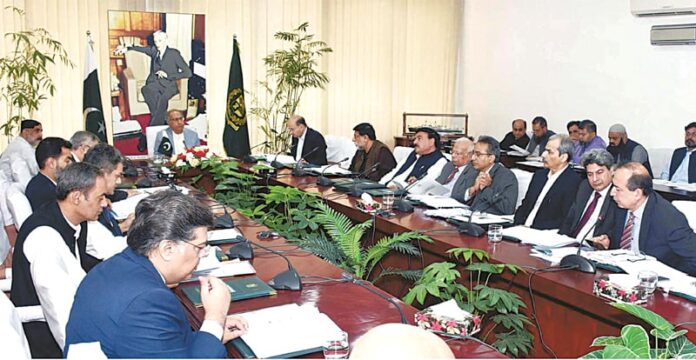ISLAMABAD: The Economic Coordination Committee (ECC) of the federal cabinet on Monday approved the Rs1.2 trillion relief package announced by Prime Minister Imran Khan a few days ago to economically facilitate people suffering due to the coronavirus pandemic.
Adviser to the Prime Minister on Finance and Revenue Dr Abdul Hafeez Shaikh chaired a special meeting of the ECC, wherein the fiscal stimulus package was approved. The package contains a Rs100bn supplementary grant for the Residual/Emergency Relief Fund in terms of Article 84(a) of the Constitution for provision of funds for mitigating the effect of the pandemic.
The forum also approved a special package for providing relief to the poor through cash assistance under the Ehsaas Programme. Under the package, cash grants would be given to 12 million families under the regular Kafalat Programme and Emergency Cash Assistance Programme on the recommendation of the district administration.
The assistance will be provided for four months and it will be a one-time dispensation. The cash will be provided either in one installment of Rs12,000 through Kafalat partner banks “Bank Alfalah and Habib Bank Limited” after biometric verification or it may be provided in two installments of Rs6,000 each.
The Poverty Alleviation Division was asked to present both options with feasibilities. The partner banks may be asked to make arrangements through branchless banking networks to disburse cash. In addition to this, Rs72.9bn of additional funds through technical supplementary grant would be given to the Benazir Income Support Programme (BISP) under the “Ehsaas Cash Assistance Package in Response to COVID-19 Pandemic”.
After Ministry of Industries and Production presented a comprehensive proposals regarding the targeting parameters , implementation mechanism, cash assistance per family per month and financial phasing of the programme, the ECC approved Rs200bn of cash assistance for the daily wagers working in the formal industrial sector and who had been laid off as a result of the COVID-19 outbreak. It was estimated that around three million workers would fall in this category and they would have to be paid a minimum wage of Rs.17,500 per month. The estimated cost of this provision for daily wagers comes around to Rs52.5bn per month.
The provincial labour departments shall ensure the delivery of assistance to the laborers while the provision of funds shall be the responsibility of the federal government. ECC directed that immediate consultation with the provincial labor departments mentioned under the provincial rules of business may be carried out for providing timely assistance to those who are in need.
ECC also approved Rs50bn for Utility Stores Corporation (USC) to provide essential food items to the vulnerable section of the society at subsidised rates. USC has prepared an initial plan to deliver 9 essential food items at Rs3,000 for a family of two to four people through Pakistan Post Foundation Logistics Division. USC has further planned to procure essential items within two to three weeks. The ECC directed that USC may engage with BISP to obtain data for targeted assistance and again come back to the ECC for a detailed proposal for reaching out to the poor families for the effective use of this package before making any expenditure from this amount.
ECC also approved Rs75bn for the Federal Board of Revenue (FBR) to enable them to payback the sales tax and income tax refunds, duty drawbacks and customs duties which is due for the last 10 years. The amount shall help approximately 676,055 beneficiaries by improving their liquidity position.
The ECC also allowed to reduce different taxes and duties on import and supply of different food items for alleviating the adverse impact of COVID -19 on different sections of the society. Rate of advance tax on the import of different pulses was reduced to 0 per cent from 2 per cent on individuals and associations of persons providing tea, spices, dry milk and salt to USC without a brand name will pay 1.5 per cent withholding tax instead of 4.5 per cent. Individuals and AoP receiving payments from USC for supplying ghee, sugar, pulses, and wheat flour shall be charged 1.5 per cent withholding tax instead of 4.5 per cent earlier. Additional Customs Duty at 2 per cent on soya bean oil, canola oil, palm oil and sunflower oil and on these four oil seeds has also been exempted.
ECC approved the supplementary grant of Rs30bn to Ministry of Commerce to pay back duty drawbacks to textile exporters in the current financial year to improve their liquidity position when their businesses are experiencing a slow down due to worldwide outbreak of coronavirus epidemic. The ECC was briefed that the State Bank of Pakistan (SBP) is working on payment of claims worth Rs49bn out of which around Rs40bn will be paid by June 2020.
The ECC approved supplementary grant of Rs6bn for Pakistan Railways to meet its expenses. Pakistan Railways’ passenger train services around the country have been suspended since March 19. The approved amount shall be utilised for paying salaries to 70,000 employees, repairs, paying for utilities and performing disinfectant sprays on platforms and inside trains for proving safe journey to the passengers. Currently, Pakistan Railways is earning only one sixth of its monthly income through coal freight and the rest is suspended.





[…] post COVID-19: ECC approves Rs1.2tr relief package appeared first on Profit by Pakistan […]
So much corruption have been done under Benazir Income Support Programme (BISP). Why The incumbent Government wait to take strict decision against them.
If our country surface politician says ,they are patriotic and sincere with Pakistani nation. Why Mr.Zar, Nawaz, Shebaz and their party’s people are not share their funds in COVIC-19 Pandemic .
When shall they will do, when our nation will die by foods scarcity.
It’s great question thereon and their all party membership.
[…] Source […]